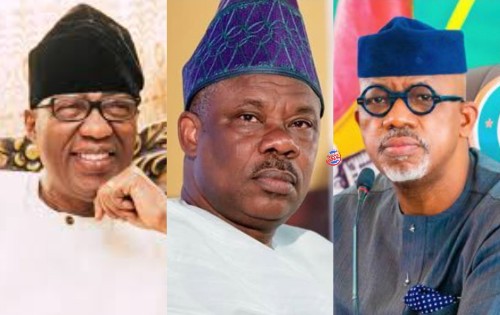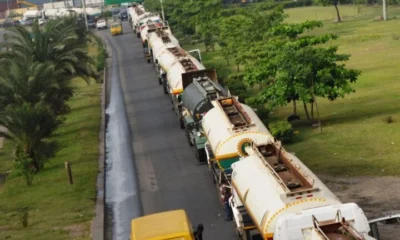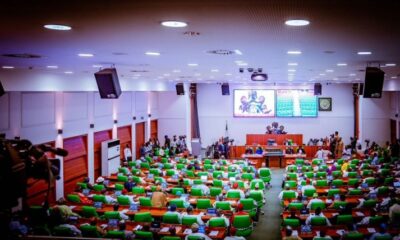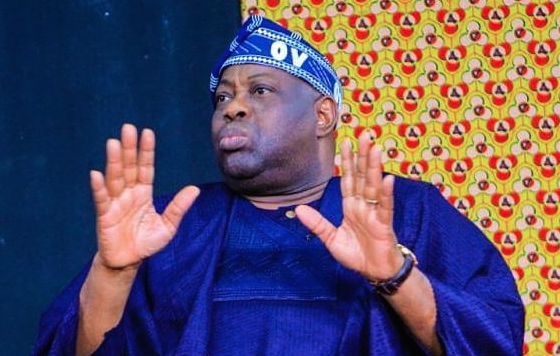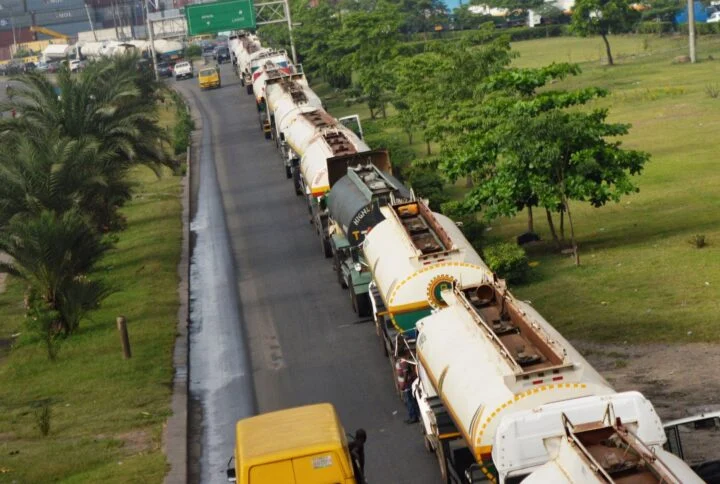“Agbalagba to ni agbara ohun o se le ba, ojo t’ewe ba sun ko, a ku ohun nikan.”
This translates to: “An elder who boasts of invincibility with power will find no one to save him when his strength eventually fails.”
The adage warns that those who misuse power or believe themselves to be invincible will ultimately face the consequences alone.
Unfortunately, this isn’t entirely true of the lot of our people, with the current crop of political leaders, because it is the people who mingle with the hangovers of the power drunkenness of our leaders.
Otherwise, how does one explain that all Senator Ibikunle Amosun would do in the face of the international charade concerning Nigeria’s contract sanctity with the seizure of ‘Presidential Jets’ is to give an incoherent explanation that he acted in error?
What becomes of a society when its leaders are more intent on out-manoeuvring each other than on steering the nation forward?
Throughout history, the consequences of leaders prioritising personal ambitions over the common good have often been dire.
The fall of the Roman Empire and the tumult of the French Revolution serve as vivid examples of how internal power struggles can destabilise even the most formidable societies.
These events underscore a recurring theme: when leaders let personal rivalries overshadow their responsibilities, the stability and progress of entire nations are jeopardised.
In the African context, the post-colonial era has been plagued by similar issues. Leaders who once united in the fight for independence frequently fell into discord, stalling national development.
Kwame Nkrumah’s vision for Ghana and Jomo Kenyatta’s leadership in Kenya were both undermined by internal conflicts and rivalries that shifted focus away from national progress towards personal agendas.
These patterns reveal how leadership conflicts can derail the aspirations of entire nations.
Nigeria’s experience, highlighting just Ogun State (with a front-burner example), mirrors this troubling trend.
Under Governor Gbenga Daniel, Ogun State saw significant progress, building on the foundational achievements of his predecessor, yet subsequent administrations often reversed these achievements due to political rivalries.
This cycle of undoing and instability highlights a broader national issue where personal conflicts detract from effective governance.
The urgent need for leadership that prioritises collective well-being over individual ambitions has never been more apparent, as the pursuit of personal agendas continues to hinder meaningful progress.
- Mirroring against local perspective of successful long-term people-agenda
Lagos State’s remarkable ascent toward becoming Africa’s second-largest economy after Nigeria is a testament to the focus on its long-term strategic economic policies, relentless infrastructure development, and a business-friendly environment—a vision and commitment apparently ingrained in all successive leaderships.
As Nigeria’s commercial hub, Lagos has attracted significant domestic and foreign investments, particularly in technology, finance, and real estate.
The state’s focus on enhancing infrastructure—such as roads, bridges, and power supply—has fuelled its industrial growth and urbanisation.
Coupled with a proactive approach to digital innovation and entrepreneurship, Lagos is rapidly emerging as a leading economic powerhouse on the continent, narrowing the gap with larger African economies.
Since 1999, Lagos has enjoyed a remarkable continuity in governance, with each governor building upon the successes of their predecessor.
Bola Ahmed Tinubu, who led from 1999 to 2007, laid the groundwork for Lagos’s financial independence and initiated major infrastructure projects like the Bus Rapid Transit (BRT) system and the metro line masterplan (Red, Blue, Green, Blue, Brown—people have only seen the realisation of the Red and Blue). His strategic vision set a powerful precedent for future development.
Babatunde Raji Fashola, who succeeded Tinubu, expanded on these initiatives by enhancing infrastructure, launching the Lagos Light Rail project, and focusing on urban renewal and environmental reforms.
Akinwunmi Ambode continued this legacy (though with some form of detour, which was quickly arrested through collective political realignment), emphasising transportation expansion and digital transformation, while Babajide Sanwo-Olu, the current governor, has sustained these efforts with major infrastructure projects and a strong response to public health challenges.
Overall, Lagos State’s governance since 1999 has been characterised by a strong sense of continuity, with each administration building upon the achievements of the previous one. This approach has enabled Lagos to sustain its rapid development, ensuring that progress is not only achieved but also preserved and expanded upon over time.
- The leadership success non-sequencing in Ogun State
Ogun and Lagos, two neighbouring states in southwestern Nigeria, present contrasting tales of governance and development.
While Lagos has benefited from a strong sense of leadership continuity, where successive governors have built upon the achievements of their predecessors, Ogun State has struggled with leadership non-sequencing.
This disjointed approach to governance in Ogun has led to stalled progress, with each administration often undoing the work of its predecessor rather than fostering a collaborative and forward-moving agenda.
The proximity of these states should ideally encourage collaborative economic development, yet the divergence in leadership styles has created a stark contrast in their trajectories, highlighting the missed opportunities for regional growth and integration.
Below is a summary of this apparent disjoint since 1999:
- Chief Olusegun Osoba (1999–2003)
Party: Alliance for Democracy (AD)
Key Achievements:
Focused on infrastructural development, including road construction and rehabilitation.
Promoted educational development with the renovation and construction of schools.
Strengthened local governance by empowering local government councils. This aligned with what was going on in Lagos State at the time, where then-Governor Tinubu built strong institutions around local development and created 37 Local Council Development Authorities. These LCDAs have over the following decades grown to become major developmental institutions, dealing with the development of internal roads and building Primary Health Centres across the states. Ogun State’s trajectory on this had been lost.
- Otunba Gbenga Daniel (2003–2011)
Party: People’s Democratic Party (PDP)
Key Achievements:
OGROMA (Ogun State Road Management Authority): Established to manage road infrastructure, leading to the construction and maintenance of several roads across the state. This aligned with what was going on in the Federal (creation of FERMA and Lagos State—Lagos Public Works Corporation). Lagosians cannot deny the impact of LSPWC that has continued to maintain Lagos roads, rather than wait for total collapse and re-awarding of new construction contracts.
Education and Health: Initiated the construction of 26 model schools and upgraded several healthcare facilities, continuing with the progress works of Osoba.
Economic Development: Spearheaded the Ogun State Economic Empowerment and Development Strategy (SEEDS), which focused on industrialisation and investment attraction.
Cargo Airport: Laid the groundwork for a cargo airport aimed at boosting trade and commerce.
Industrialisation: Attracted various industries to Ogun State, positioning it as an industrial hub. The Ogun State Free Trade Zone, now a subject of controversy and international embarrassment, was a major milestone of this administration. In contrast, the Lagos Free Zone that was continued and nursed by successive Lagos Governors now houses a 2.7 million TEU Lekki Deep Sea Port, the world’s largest single-train refinery, Dangote Refinery (an investment of $20 billion), Kellogg’s, Colgate-Palmolive, Tolaram Group, Bolloré Logistics, BOS (Brass Oil Services), and many more.
- Senator Ibikunle Amosun (2011–2019)
Party: All Progressives Congress (APC)
Key Achievements:
Infrastructural Development: Notable for extensive road construction, particularly in Abeokuta, which transformed the state capital’s landscape.
Urban Renewal: Launched various urban renewal projects, including the construction of flyovers and bridges to ease traffic congestion.
Education: Built and renovated schools, with a focus on improving the quality of education.
Security: Enhanced security in the state, making it safer for residents and investors.
Healthcare: Improved healthcare facilities and services, with the construction of new hospitals and the upgrading of existing ones.
Vendetta Against Predecessor: However, his administration was also marked by the reversal of many of OGD’s projects, including the shutdown of some of Daniel’s personal businesses.
- Dapo Abiodun (2019–Present)
Party: All Progressives Congress (APC)
Key Achievements:
Road Infrastructure: Road construction in the state is almost non-existence and where construction seemed to be carried out, they are reputed to be poorly done. He was also criticised for focusing on road leading to his personal residence and terminating the construction immediately after his fence.
Education and Health: Neglected unfinished projects from Amosun’s tenure.
Economic Initiatives: Launched initiatives to boost the state’s economy, including efforts to attract more investors.
Conflict with Predecessor: Similar to Amosun, Abiodun has been accused of reversing or ignoring projects initiated by his predecessor, including those Amosun couldn’t complete.
- Summary of transition from Daniel to Amosun to Abiodun
Otunba Daniel, now a serving senator at the national assembly representing Ogun East, focused on broad-based development, including road infrastructure, education, and industrialisation, but many of his projects were reversed or neglected by Senator Ibikunle Amosun, who was driven by a perceived vendetta against Daniel.
Dapo Abiodun has continued this trend, prioritising his own projects while neglecting those left behind by Amosun.
This pattern of governance has resulted in a cycle where each governor undoes the work of their predecessor, leading to stalled progress in Ogun State.
For example, the city of Abeokuta, the state capital, is littered with incomplete roads and partly demolished buildings here and there. Places like Adedotun, Mokola, Saje, and Ilugun are typical examples, giving the appearance of a ghost town.
- The import of the seized planes
The recent seizure of three jets owned by the Nigerian government by a French court underscores the far-reaching consequences of these internal conflicts.
The seizure stems from a long-standing dispute with a Chinese company over a 2007 contract involving Ogun State (a contract entered into by the Government of Otunba Gbenga Daniel in alignment with similar progressive moves by Lagos State).
The fallout from this conflict has not only embarrassed Nigeria on a global scale but also highlighted the deep-seated issues of governance and leadership rivalries that continue to plague the nation.
This incident serves as a reminder of the price nations pay when their leaders prioritise personal vendettas over the collective good. The global embarrassment, economic setbacks, and erosion of public trust that result from such conflicts underscore the urgent need for a shift in leadership priorities.
The Ogun State saga, mirrored by the seizure of Nigerian assets abroad, illustrates how the failure to transcend personal grudges can lead to significant national repercussions.
- The consequences of political vendettas
Political vendettas among leaders disrupt governance, erode public trust, and hinder economic progress.
When leaders prioritise personal grudges over their mandate, ongoing projects are abandoned, and policy reversals become common. This cycle of neglect and instability, as seen in Ogun State, leads to wasted resources and stunted development.
The constant undermining of predecessors damages public confidence and discourages investment, resulting in economic setbacks. The recent global embarrassment over seized planes further illustrates how such conflicts tarnish a nation’s image and strain international relations.
Lagos and Ogun, neighbouring states with immense potential, should have leveraged their proximity to build a robust regional economy.
Instead, Ogun’s inability to realise its potential due to petty rivalries has stymied progress that could have strengthened the region’s economic power in the coming decades.
A striking, saddening instance of a power-drunk blunder is the demolition of the investment of a political rival’s spouse by current governor Abiodun.
Rather than pulling down the one-billion-naira shopping complex, Dapo Abiodun could have embraced the economic promise it represented and used it as a springboard for broader development for the host community—in this sense, it is the people who bear the consequences.
Tinubu invested in developing the transport master plan, particularly metro lines, did the feasibility, planning, and policy framework of Lagos Light Rail. Fashola started the Light Rail Project, Ambode continued, Sanwo-Olu completed it, and Lagosians are happily benefiting from a progressive transport system.
It took 20 years, four administrations, one result: improved livelihood for the people. That’s the power of continuity!
In a world where leadership can either forge paths to prosperity or mire us in conflicts of the past, the choice is clear: let not the pettiness of today erase the promise of tomorrow.

 BIG STORY4 days ago
BIG STORY4 days ago
 BIG STORY2 days ago
BIG STORY2 days ago
 BIG STORY3 days ago
BIG STORY3 days ago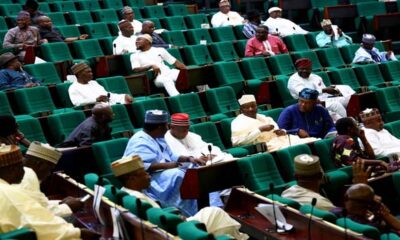
 BIG STORY4 days ago
BIG STORY4 days ago
 BIG STORY2 days ago
BIG STORY2 days ago
 BIG STORY12 hours ago
BIG STORY12 hours ago
 BIG STORY2 days ago
BIG STORY2 days ago
 BIG STORY12 hours ago
BIG STORY12 hours ago




